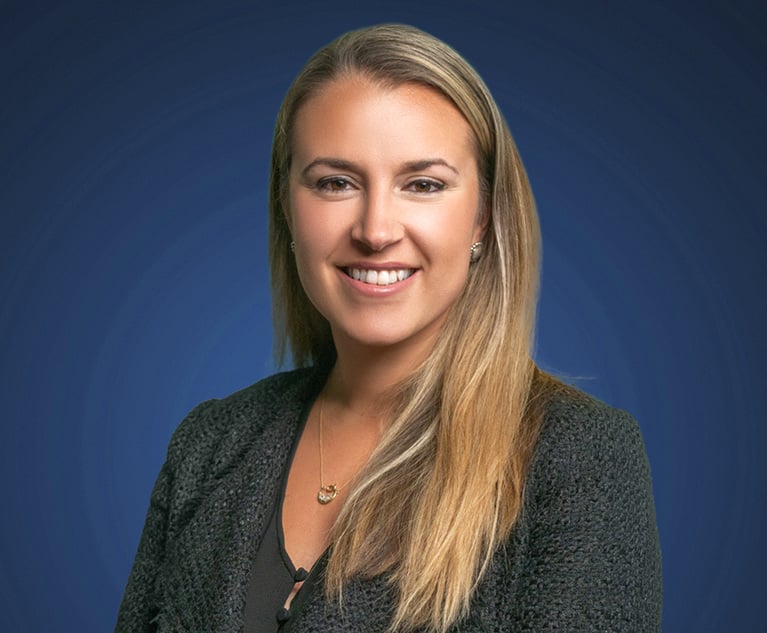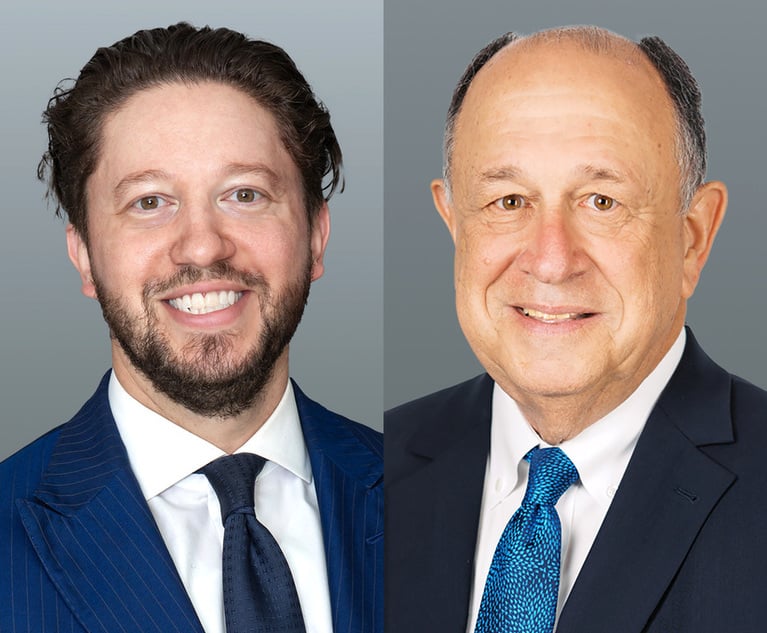 Pennsylvania State Capitol. Photo credit: Zack Frank/Shutterstock.com
Pennsylvania State Capitol. Photo credit: Zack Frank/Shutterstock.comPa. High Court Makes DACA Recipients Eligible for Bar Admission
The Pennsylvania Supreme Court adopted a change to Rule 202 of the Bar Admission Rules updating the rule to explicitly say for the first time that those with DACA status are eligible for admission.
February 14, 2019 at 03:41 PM
5 minute read
There are more than 200 hundred questions on the Pennsylvania Bar Exam, but for the past few years there was one question even the Pennsylvania Board of Law Examiners wasn't sure how to answer.
The question wasn't one that bar applicants are graded on. Instead, it was the question asking about the would-be lawyer's immigration status, and what stumped the board was whether applicants with Deferred Action for Childhood Arrivals status, sometimes called “Dreamers” after a legislative initiative designed to support them, should be admitted to the bar.
Last week, the board received its answer when the Pennsylvania Supreme Court adopted a change to Rule 202 of the Bar Admission Rules updating the rule to explicitly say for the first time that those with DACA status are eligible for admission.
According to C. Robert Keenan III, chairman of the Pennsylvania Board of Law Examiners, the group sought the rule change to provide clarity on the issue.
“The board felt that it just should make clear to bar applicants that DACA status was not going to be a factor,” Keenan said. “We're grateful to the justices that they enacted the rule change.”
 Parthiv Patel, of Parker McCay.
Parthiv Patel, of Parker McCay.
For Parthiv Patel, now an associate at Parker McCay in Mount Laurel, New Jersey, focusing on corporate law, the change means other Dreamers won't have to go through the 18 months of appeals that he did when he sought to be admitted to the Pennsylvania bar.
“It does take a mental toll. The whole experience of not knowing, and having to wait afterwards. It did take a mental toll,” Patel said. “I think the rule change is great. As long as they pass the bar and don't have any other blemishes, they're in the clear for being a practicing attorney and meeting their dreams.”
Patel, who was brought from India to live in New Jersey when he was 5, went to Rutgers University and then, inspired to become an attorney after his parents were defrauded out of more than $100,000 in a business venture, he attended the Drexel University Thomas R. Kline School of Law.
Patel said that, while others were worrying about the questions that might be on the graded parts of the bar exam, he was additionally worried about the questions that were not graded—the questions about his immigration status, and whether it would bring his career as an attorney to an end before it could start.
“I always kind of had a feeling that my status was going to be an issue,” Patel said. “I kept putting it on the back burner until my last semester of law school. At that point I had to apply to the bar.”
Patel said he began speaking with attorneys at the American Civil Liberties Union, and took the Pennsylvania and New Jersey exams in July 2016. The week before the results were posted online, he was told that, although he passed the exam, he wouldn't be admitted to the Pennsylvania bar due to his immigration status.
The particular sticking point was that U.S. Code 8 Section 1621 says undocumented immigrants are not eligible for state benefits, such as professional licenses. But the law further allows for states to opt out of those restrictions.
Patel, with the help of ACLU attorney Molly Tack-Hooper, appealed, contending that the statute shouldn't apply, and that, even if it did, the state should opt out. A handful of groups from Pennsylvania and beyond, including the city of Philadelphia, Drexel University, the Philadelphia Bar Association and the Yale Ethics Bureau, sent letters supporting Patel's efforts.
 Parthiv Patel, left, is sworn in to the Pennsylvania Bar by Philadelphia Judge Lisa Rau, right.
Parthiv Patel, left, is sworn in to the Pennsylvania Bar by Philadelphia Judge Lisa Rau, right.
In late November 2017, the board determined that Patel should be admitted to the bar in Pennsylvania. He was admitted to the bar in New Jersey soon after.
Nearly a year after being accepted to practice, the Board of Law Examiners announced a proposal to change the law, saying that the change would make it “clear that Pennsylvania is opting out” of the federal restrictions regarding granting law licenses to those with DACA status.
Keenan said the board did not receive any comments to the proposal, which he said was surprising, given how politicized the topic of Dreamers has become. The only concern from the justices, he said, was whether the change would open the board up to litigation, which, Keenan said, it would not.
“We did not think that this was a controversial position. Just a clarification of Pennsylvania bar rules,” he said.
Tack-Hooper said she was somewhat disappointed the law only addresses those on DACA status, while there are many other groups of immigrants who would otherwise be eligible to become attorneys. But, overall, she lauded the rule change.
“It is a tiny bit of good news for immigrants in a really dark time,” she said. “Even if there are only 10 people who get to be lawyers because of this, I think it has really strong symbolic value, and I'm grateful the board took a stand in support of immigrants.”
The rule change puts Pennsylvania, along with California and New York, into a group of about 10 states that allow Dreamers to be admitted to the bar.
Tack-Hooper and Patel noted that the change may also provide some guidance to bar examination boards in other states that may now seek to tackle the question.
This content has been archived. It is available through our partners, LexisNexis® and Bloomberg Law.
To view this content, please continue to their sites.
Not a Lexis Subscriber?
Subscribe Now
Not a Bloomberg Law Subscriber?
Subscribe Now
NOT FOR REPRINT
© 2024 ALM Global, LLC, All Rights Reserved. Request academic re-use from www.copyright.com. All other uses, submit a request to [email protected]. For more information visit Asset & Logo Licensing.
You Might Like
View All

3rd Circuit Strikes Down NLRB’s Monetary Remedies for Fired Starbucks Workers


Phila. Judge Upholds $68.5M Verdict Over Construction Worker's Death
3 minute readTrending Stories
- 1It's Time To Limit Non-Competes
- 2Jimmy Carter’s 1974 Law Day Speech: A Call for Lawyers to Do the Public Good
- 3Second Circuit Upholds $5M Judgment Against Trump in E. Jean Carroll Case
- 4Clifford Chance Hikes Partner Pay as UK Firms Fight to Stay Competitive on Compensation
- 5Judicial Conduct Watchdog Opposes Supreme Court Justice's Bid to Withdraw Appeal of Her Removal
Who Got The Work
Michael G. Bongiorno, Andrew Scott Dulberg and Elizabeth E. Driscoll from Wilmer Cutler Pickering Hale and Dorr have stepped in to represent Symbotic Inc., an A.I.-enabled technology platform that focuses on increasing supply chain efficiency, and other defendants in a pending shareholder derivative lawsuit. The case, filed Oct. 2 in Massachusetts District Court by the Brown Law Firm on behalf of Stephen Austen, accuses certain officers and directors of misleading investors in regard to Symbotic's potential for margin growth by failing to disclose that the company was not equipped to timely deploy its systems or manage expenses through project delays. The case, assigned to U.S. District Judge Nathaniel M. Gorton, is 1:24-cv-12522, Austen v. Cohen et al.
Who Got The Work
Edmund Polubinski and Marie Killmond of Davis Polk & Wardwell have entered appearances for data platform software development company MongoDB and other defendants in a pending shareholder derivative lawsuit. The action, filed Oct. 7 in New York Southern District Court by the Brown Law Firm, accuses the company's directors and/or officers of falsely expressing confidence in the company’s restructuring of its sales incentive plan and downplaying the severity of decreases in its upfront commitments. The case is 1:24-cv-07594, Roy v. Ittycheria et al.
Who Got The Work
Amy O. Bruchs and Kurt F. Ellison of Michael Best & Friedrich have entered appearances for Epic Systems Corp. in a pending employment discrimination lawsuit. The suit was filed Sept. 7 in Wisconsin Western District Court by Levine Eisberner LLC and Siri & Glimstad on behalf of a project manager who claims that he was wrongfully terminated after applying for a religious exemption to the defendant's COVID-19 vaccine mandate. The case, assigned to U.S. Magistrate Judge Anita Marie Boor, is 3:24-cv-00630, Secker, Nathan v. Epic Systems Corporation.
Who Got The Work
David X. Sullivan, Thomas J. Finn and Gregory A. Hall from McCarter & English have entered appearances for Sunrun Installation Services in a pending civil rights lawsuit. The complaint was filed Sept. 4 in Connecticut District Court by attorney Robert M. Berke on behalf of former employee George Edward Steins, who was arrested and charged with employing an unregistered home improvement salesperson. The complaint alleges that had Sunrun informed the Connecticut Department of Consumer Protection that the plaintiff's employment had ended in 2017 and that he no longer held Sunrun's home improvement contractor license, he would not have been hit with charges, which were dismissed in May 2024. The case, assigned to U.S. District Judge Jeffrey A. Meyer, is 3:24-cv-01423, Steins v. Sunrun, Inc. et al.
Who Got The Work
Greenberg Traurig shareholder Joshua L. Raskin has entered an appearance for boohoo.com UK Ltd. in a pending patent infringement lawsuit. The suit, filed Sept. 3 in Texas Eastern District Court by Rozier Hardt McDonough on behalf of Alto Dynamics, asserts five patents related to an online shopping platform. The case, assigned to U.S. District Judge Rodney Gilstrap, is 2:24-cv-00719, Alto Dynamics, LLC v. boohoo.com UK Limited.
Featured Firms
Law Offices of Gary Martin Hays & Associates, P.C.
(470) 294-1674
Law Offices of Mark E. Salomone
(857) 444-6468
Smith & Hassler
(713) 739-1250





